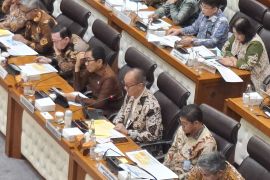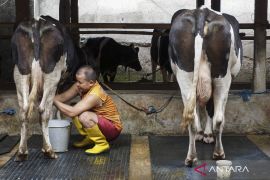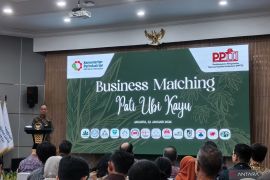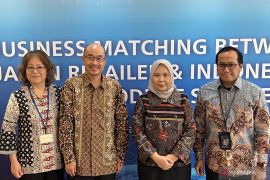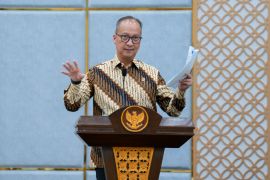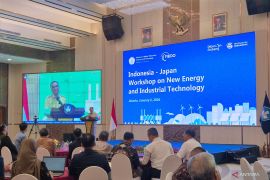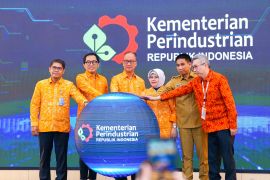The bamboo market, which was valued at US$70.59 billion in 2023, will be worth US$75.12 billion in 2024, with a compound annual growth rate (CAGR) of 6.4 percent.
This was caused by several driving factors, such as increased environmental awareness, climate change mitigation, application versatility, and government support.
Indonesia is blessed with abundant bamboo plants. According to data from the Coordinating Ministry for Economic Affairs, of the 1,620 types of bamboo in the world, 176 species, or 10 percent of them grow in Indonesia, and of that figure, 105 types of bamboo are endemic, meaning that they can only be found in Indonesia.
In Indonesia, bamboo has an important role in the culture and economy of society. Bamboo is used for various purposes, such as building materials, household equipment, musical instruments, and arts and crafts.
Bamboo plants are also a land healer. Bamboo is able to grow on critical or damaged land and improve soil conditions. The rhizome tissue is able to stabilize the soil, thereby preventing erosion and landslides.
Bamboo plants can also store water, wherein one healthy bamboo clump, with around 36 stems, is capable of storing up to 3,600 liters of water, or equivalent to 189 gallons, in every rainy season. The existence of bamboo forests also ensures the sustainability of springs.
Moreover, bamboo can function as a carbon absorber. A healthy bamboo plant is able to absorb and store carbon up to 3.33 tons of CO2 eq. This shows that bamboo plays an important role in maintaining the air quality and mitigating the impacts of climate change.
Additionally, bamboo can play a role as a renewable energy source. Bamboo charcoal, bioethanol, and bamboo-based biomass energy have the potential to become sustainable energy sources.
Furthermore, bamboo can serve as an industrial driver with its rapid growth and sustainable harvest, thereby making it a valuable raw material for the industry. Around 1,500 types of bamboo are used in various industries ranging from construction, household appliances, tableware, and textiles to medicine and food.
Related news: Need bamboo product development strategy: BRIN
Bamboo road map
The Indonesian government is aware of the benefits and huge potential of bamboo. The Ministry of Industry is currently preparing a road map for development of the Indonesian bamboo industry.
The ministry’s Director of the Forest and Plantation Product Industry, Setia Diarta, expressed hope that the bamboo industry road map would provide a strong basis and guidance for the government to formulate strategies for developing the industry.
The preparation of this road map has several goals, with the first being that the government seeks a solid legal basis to support the bamboo industry. This will not only create legal certainty but also provide a basis for policies to support investment and growth of the bamboo industry.
Second, the government aims to build a steady and efficient national bamboo industry institution. Through professional, accountable, and integrity governance, the bamboo industry is expected to develop sustainably without being affected by market fluctuations or raw material uncertainty.
The third goal is to achieve independence in sourcing raw materials for the national bamboo industry. This is important due to uncertainty in the supply of raw materials that can disrupt smooth production.
Furthermore, the government is keen to improve the skills of bamboo industry players in dealing with the latest technological developments. By strengthening their control over machines and supporting equipment, the bamboo industry is expected to remain competitive at least in 2045.
In addition, this road map was prepared to support the downstreaming of bamboo products and increase continuous innovation to compete with international markets.
Increasing public awareness about the importance of bamboo for the economy and the environment is also important. The issue of sustainability is a major concern in development of the bamboo industry.
Although the government is in the process of data collection to determine priorities in developing the bamboo industry, several potential bamboo industries can be developed, such as furniture products, crafts, panels, laminated bamboo, and tableware.
Those sectors need proper support and development since they show huge potential, such as the use of bamboo in the form of toothbrushes, combs, and tableware in star-rated hotels. This trend reflects people’s awareness of bamboo’s benefits and value as a sustainable material.
Related news: Bamboo has high value due to sustainability: KADIN
Sustainability
Bamboo has emerged as an important alternative to wood in the manufacturing industry. Its sustainable and environmentally friendly nature makes it an ideal option for reducing environmental impact.
The demand for environmentally friendly products continues to grow. Apart from individual customers, export destination countries in Europe are also starting to seek more sustainable products.
Bamboo has vast potential to replace wood for several reasons. Bamboo is known as a plant with a much faster harvest cycle than wood, thereby allowing for sustainable production without deforestation.
Bamboo growth is also fast, reaching 60-90 cm per day, depending on the soil and climatic conditions. Bamboo grows at a much faster rate than wooden trees that take decades to grow.
Bamboo, on the other hand, is a giant herbaceous plant having a shorter life cycle, with a harvest time of only three to four years. Bamboo can be harvested sustainably once it reaches maturity, without the need to cut down the entire plant.
Indonesia has hundreds of types of bamboo with the potential to be processed into sustainable, environmentally friendly, and versatile bamboo products.
Challenge
However, development of the bamboo industry in Indonesia faces several challenges, such as technological limitations, industrial structure, and availability of raw materials.
Indonesia still lacks technology and bamboo research and development. China currently dominates the world's bamboo exports at 70 percent, showing its superiority in bamboo technology and research and development.
"Indonesia is only ranked 10th, with a maximum proportion of one percent of the total world export value," Diarta remarked.
In terms of the industrial structure, the Indonesian bamboo industry is still hampered by weak industrial support, such as continuity of raw materials, domestic components, and low competitiveness. This was caused by the widespread management of bamboo carried out by cooperatives, resulting in a long and expensive logistics chain.
Another challenge that arises is the uncertainty of raw material availability. This is caused by the scattered location of bamboo. Indobamboo Bali, for example, is one of the bamboo companies that is currently in the process of a moratorium or temporarily stoppage of production due to uncertainty in raw materials.
In order to establish a bamboo industry, sufficient bamboo plantations are needed. Currently, the area of bamboo plantations in Indonesia is still uncertain. The Industry Ministry is still calculating and mapping out bamboo locations across Indonesia.
One solution to increase national bamboo stocks is to utilize social forest land to plant bamboo in collaboration with the Ministry of Environment and Forestry. Social forests are those managed by communities to improve their welfare.
Meanwhile, Head of Programs at the Sustainable Environmental Bamboo Foundation (YBLL), Nurul Firmansyah, stated that in comparison with neighboring countries, bamboo development in Indonesia is still lagging on account of its inability to manage abundant bamboo resources.
The use of bamboo in Indonesia is still limited. Hence, the diversification of bamboo processing products needs to be encouraged to produce bamboo products as wood substitutes.
The domestic bamboo market in Indonesia is still dominated by handicraft products, while the use of bamboo as a construction raw material is still quite minimal.
Indonesia can emulate other countries, such as China and Vietnam, which have developed their bamboo industry rapidly.
In order to achieve this goal, the government's involvement in facilitating land provision, seeding, planting, and industrial growth at the village and subnational levels is highly suggested.
Governmental support is also needed to build the bamboo ecosystem and industry in Indonesia, especially in improving the quality of human resources, enabling the provision of capital, facilitating industrial development, and ensuring the adequacy of bamboo resources to be used on an industrial scale.
Overall, developing Indonesia's bamboo industry is not merely about creating new business opportunities but also building a sustainable future for the economy and the environment.
With a solid road map and all-out support from the government and society, Indonesia has a great opportunity to become a leader in the global bamboo industry. One of the main keys lies in diversifying or developing various bamboo products that will open up wider market opportunities and increase the competitiveness of the Indonesian bamboo industry.
Related news: SME Ministry ready to help expand marketis of bamboo products
Editor: Yuni Arisandy Sinaga
Copyright © ANTARA 2024




